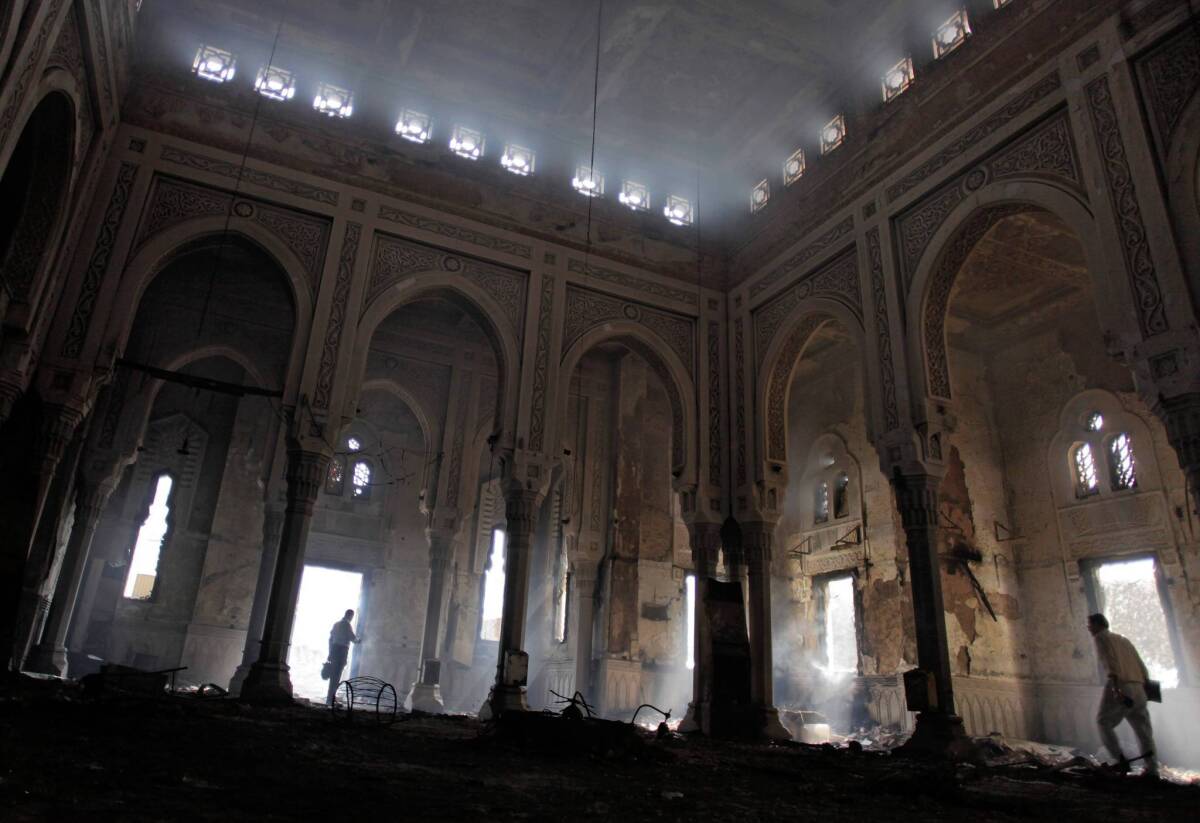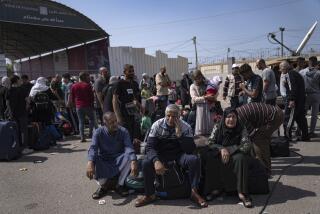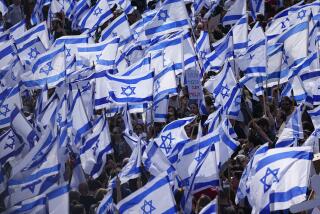God is everywhere in Egypt

CAIRO â In politically fractured Egypt, thereâs one belief that almost every faction seems to hold in common: God is on our side. (And not, therefore, on yours.)
Egyptâs social and cultural mix is hieroglyphic in its complexity: Islamists, progressives, conservatives, and those marching in lock step with the powerful military. But in the Arab worldâs most populous and influential country, the many guises of piety are rarely absent from discourse.
More than two months after the now-banned Muslim Brotherhood was driven from power and the countryâs army chief, Gen. Abdel Fattah Sisi, surged to the fore, Egypt remains deeply divided about the role of religion in public life. Whether in fiery mosque sermons, slow-moving constitutional deliberations or triumphal military statements, the banner of heaven is being waved by all sides.
âReligion is being more or less used the same way by the military as it was by the Brotherhood,â said Ahmad El Azabawy, a former political science professor who is now an independent analyst. âJust with more subtlety, because now, of course, people are just coming out of a bitter experience with an Islamic regime.â
Religious minorities make up about 15% of the population, and Islam is the state religion. It pervades daily existence in Egypt as surely as the muezzinâs call echoing through dusty streets. But the Brotherhood, during its tumultuous year at the helm of government, managed to rankle many who considered themselves good enough Muslims without its relentless exhortations on how best to serve God.
Widespread anger at Islamist President Mohamed Morsiâs ineffectual and heavy-handed governance may have been the driving force behind massive street protests against his rule that paved the way for the July 3 military-led coup that shoved him aside. Yet the Brotherhoodâs particular brand of piety, casting censorious eyes on everything from ballet performances to maternity leave for working women, had chafed almost as hard, particularly in cosmopolitan cities such as Cairo and Alexandria.
Although the armyâs grip appears secure for the moment, Sisi and his lieutenants remain wary of a backlash from Brotherhood sympathizers, up to 2,000 of whom have been jailed. And while only muted public criticism greeted the violent rout of Morsiâs followers last month that left hundreds dead, the army is taking no chances. Commanders are rushing to cast themselves as defenders of the faith.
âOf course to some extent the army and police are resorting to religious-type speech, because first of all, one of the main constituents of the Egyptian character is religion, so thatâs one way to appeal to people,â said writer and reformist activist Adel Shahin. âYou can even find someone who doesnât practice at all will get offended if you insult his religion.â
For the authorities, a particular point of concern is that devout and uneducated conscripts in the security forces, especially the police, could be swayed by Brotherhood rhetoric urging them not to turn on fellow Muslims. The groupâs teachings are still widely disseminated, even though most of its leaders are imprisoned and the interim government is moving to root out what it considers rogue elements among the countryâs hundreds of thousands of imams, or mosque preachers.
Sisi and other top military leaders routinely employ religious rhetoric to rally the troops, many of whom have been deployed to fight Islamic militants in the Sinai Peninsula and elsewhere. Confrontations with these âterrorists,â whether out in the vast desert reaches or in crowded Cairo slums, are described by the military leadership as carrying divine blessings, as well as patriotic accolades, for those who take part.
âWe are God-fearing people,â Sisi told a class of graduating recruits, weeks after he led the coup against Morsi. âIf anyone thinks they can defeat those who fear God, they are delusional.... No one can ever defeat those who fear God.â
Egypt has always enjoyed enormous prestige across the Muslim world, but its deposing of an elected Islamist has tarnished its standing with some neighboring leaders, including Turkeyâs. Gamal Sultan, editor in chief of the newspaper Al Mesryoon, said Morsiâs followers have focused on âframing the coup as a coup against Islam, a war against Islam and Muslims.â
One potentially worrying scenario for Egyptian authorities is that outside Islamic militants could see their country as a new battleground. Egyptian military officials, who claim hundreds or even thousands of foreign fighters are operating in the Sinai Peninsula, warn outsiders there is no legitimate holy war to be fought against the army or the interim government.
âEgypt ⌠will never be an infidel state as some have claimed,â the chief army spokesman, Col. Ahmed Ali, said during a news conference this month.
If degrees of devoutness are a code by which public figures are judged, Sisi himself is something of a cipher. Morsi was apparently confident enough of the generalâs religious orthodoxy that he appointed him defense chief in the short-lived Brotherhood-run government. At the time, many progressive-minded Egyptians were put off by the fact that Sisiâs wife wears the niqab, the full-face veil that most Egyptian women still eschew.
In a leaked recording that surfaced this month, former leader Hosni Mubarak â no stranger to realpolitik â was reportedly heard to praise Sisiâs âcunningâ in winning Morsiâs trust before overthrowing him. Sisi has said he fruitlessly urged Morsi to mend his ways.
Religious fault lines are likely to be on fresh display as a 50-member committee comes down to crunch time in drafting a new constitution. Some of the fiercest wrangling has come over wording regarding the role of Islamic law in guiding the country.
While Sisi is walking a fine line, his political stock is rising daily, in part because he has tapped into Egyptâs traditionally fervent nationalism.
Even his speaking style is strikingly reminiscent of Gamal Abdel Nasser, who launched his own crackdown on the Brotherhood, back in the 1950s. With followers launching a grass-roots campaign to get Sisi to run for president, striking just the right balance of piety and politics could continue to prove a winning formula, said Shahin, the analyst.
âSomeone who loves God, and whose patriotism is unquestionable and unparalleled â wouldnât he make the perfect leader?â he said.
Special correspondent Ingy Hassieb contributed to this report.
More to Read
Sign up for Essential California
The most important California stories and recommendations in your inbox every morning.
You may occasionally receive promotional content from the Los Angeles Times.










